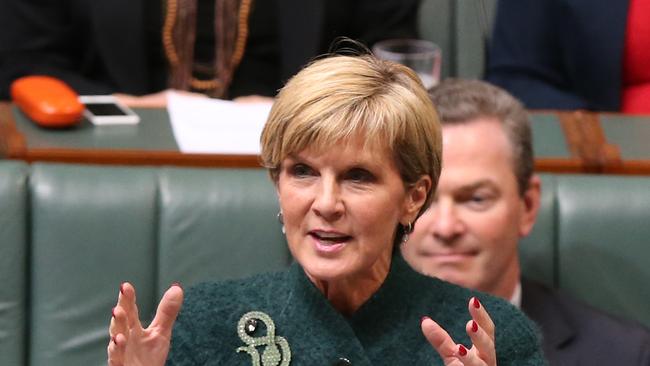Boat bribery row escalates
People-smugglers bribed Indonesian police to seal the departure of the boat that has sparked a diplomatic storm.

People-smugglers bribed Indonesian police to allow the departure of the asylum-seeker boat that has provoked a diplomatic storm since it was intercepted at sea by Australian Customs and the navy late last month, according to sources.
The Indonesian police, as well as the passengers on the boat, have alleged that Australian officials paid six crew members about $US5000 each to take the asylum-seekers back to Indonesia.
The Abbott government has refused to confirm or deny the story but reports through the week suggested money might have been paid by an officer of the Australian Secret Intelligence Service.
Australia’s ambassador to Indonesia Paul Grigson yesterday handed a letter from Foreign Minister Julie Bishop to her counterpart Retno Marsudi, after the Indonesians had sought more information about Australia’s conduct.
Indonesian Foreign Ministry spokesman Arrmanatha Nasir said there was no explanation in the correspondence of whether Australia paid cash to the asylum boat crew.
The Weekend Australian has learnt more about the details of the boat and its interception, including the fact that Indonesian police were bribed to allow the boat’s passage, information which might again inflame the dispute over the boat.
When the Australians came upon the boat the sea was extremely rough, with a very heavy swell. The Indonesian crew were in radio or phone contact with backers of the venture on the Indonesian mainland. These figures in Indonesia were instructing the crew to proceed with the journey no matter what opposition, including from Australian officials, they may encounter.
The boat was headed for New Zealand but the Australians who intercepted it were certain that it was so unseaworthy it could not possibly get that far.
At all times, the Australians involved gave the highest priority to the safety of life at sea. There was a strong danger that all 65 passengers plus the six crew could end up in the water which, given the roiling conditions, would have made their rescue extremely difficult.
At one point in the operation several Australian personnel were in the water and decisions had to be made quickly in the extremely difficult conditions.
Mr Grigson is believed to have told Ms Marsudi yesterday that Australia’s actions in dealing with the boat were lawful.
However, news agency AAP reported yesterday that the Indonesian Foreign Ministry did not receive any new explanation from Mr Grigson.
“When we did not receive any new information or any clarification, again, like I said, we cannot be blamed for taking the view that there was an illicit payment made to the smugglers,” Mr Nasir said.
A boat captain and five crew members are still being questioned by police on the Indonesian island of Rote for aiding the 65 people on board the vessel.
Ms Retno asked Mr Grigson to seek an explanation of the claims on Saturday, before she left for meetings in Norway. He visited her office for about 20 minutes yesterday, their first formal get-together since he returned from his recall over Indonesia’s execution of Bali Nine drug-smugglers Andrew Chan and Myuran Sukumaran. “Australia remains very committed to co-operation with Indonesia to combat people-smuggling in all its forms,” Mr Grigson said after the meeting.
“As my Prime Minister has said repeatedly … Australian officials have always acted within the law in this case.”
As The Australian revealed this week, ASIS has a history of more than a decade of using money to gain information and leverage in people-smuggling gangs. In 2009, Kevin Rudd allocated an extra $21 million for it to use disrupting people-smuggling networks. A certain amount of this money has always been used not only to pay for information, but to provide incentives for people-smugglers to betray their fellow criminals.
At the same time, the Australian Federal Police have a long record of providing technical and financial assistance to Indonesian police.
Sources say the accusation made by some Indonesians that the Australians intentionally left the Indonesian boats involved with insufficient fuel to make it back to the Indonesian mainland is completely false.
They point out that this would not only breach the basic requirement to protect the safety of life at sea but that it would be a disastrous course to take, in humanitarian terms and politically.
Australian Customs and navy personnel have an exemplary record in rescuing people at sea. Under the Abbott government’s Operation Sovereign Borders, no one has drowned.
Indonesia’s Vice-President, Jusuf Kalla, has accused Australia of corrupt behaviour by paying money to people-smugglers.
However, Indonesian police are renowned for taking bribes in relation to people-smuggling.
Australia provides a great deal of official assistance to Jakarta to help it deal with the problems arising from the people-smuggling industry. This year, it will provide funding that supports about half of the refugee and asylum-seeker population in Indonesia. Canberra will give more than $40 million to the International Organisation for Migration to deal with these issues.
Indonesia has been a major beneficiary of the effectiveness of Operation Sovereign Borders, as it has resulted in substantially fewer people going to Indonesia to seek to come to Australia.



